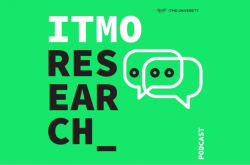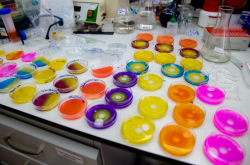Summer school’s key objectives
The choice of the 2018 Russian Geographical Society summer school’s theme, “Popularization of Geography”, wasn’t coincidental. For several years now, the RGS has been hosting the national “Geographical dictation”, which gives everyone the opportunity to put their geographical knowledge to the test. Unfortunately, for an average Russian that doesn’t amount to much, as the average score of participants hovers around the “satisfactory” mark, a rather unsatisfactory fact lamented by the Russian Geographical Society networking projects coordinator Andrey Katorgin.
“Most people have a simplistic notion of geography as a science that does no more than putting rivers and countries on the map. In reality, though, geography is an umbrella for more than two dozens of different scientific fields. Geographers work in airports, contribute to pipe routing, research climate change, and explore glaciers; geography plays a significant role in many areas of our daily life, but few people know that. We work on breaking away from this limited understanding of geography and making the general public interested in our science. This summer school is one step in this direction. We want participants to not only discover a wealth of new opportunities in the field of geography, but also learn to find creative ways of speaking about these opportunities to make geography popular, accessible, and fun,” commented Andrey Katorgin.
The science of geography can be subdivided in four separate branches: theoretical geography, physical geography, human geography, and military geography. All these branches, in turn, encompass many other scientific spheres which offer boundless opportunities for work and research: from the scientific quest for physicogeographical patterns and in-depth study of the Earth and its many biosystems to the exploration of societal behaviors. Each year, more and more people choose to attend the Russian Geographical Society’s Festival, which is seen as good news by the science popularizers. The field is buzzing with other events, too: this June, the International Geographical Union and the Russian Academy of Sciences’ Institute of Geography co-hosted the “Practical geography and XXI century challenges” international conference, which was held in Moscow and brought together prominent geography scientists and practitioners debating problems and opportunities the science faces today.

“The conference was a three-day event, which shows that geography is confronted by many challenges which can be solved by the new generation of young geographers and should be talked about and popularized. The ”Geography for All” summer school is a great way of engaging people in geography’s topical issues,” said Olga Khimchenko, a consultant at the Russian Geographical Society’s Department of Expert-Analytical and Project Work.
The summer school’s participants had the chance to meet and attend lectures of the Russian Geographical Society Serbian Development Center director Miroljub Milincic, president of the Greek Association of Geographers Statis Arapostatis, editor-in-chief of the Science and Life magazine Elena Lozovskaya, editor-in-chief of the Vokrug Sveta magazine Sergey Apresov, TV presenter and information policy advisor to the President of the Russian Geographical Society Anastasia Chernobrovina, scriptwriter Alexander Melnik, as well as many other science and culture towering figures. ITMO’s Faculty of Physics Professor Sergey Stafeev gave participants a science-pop lecture and first-hand tour at the university’s Museum of Optics.
Popular Finnish blogger Timo Hämäläinen also shared his experience of how Finns use social media to change their cities for the better, while the Institute of Plant and Animal Ecology of the Russian Academy of Sciences’ Urals Department science communicator Nina Sadykova gave a talk advocating for birdwatching, which is not only a fun biology-related hobby but also an important scientific activity that helps researchers keep track of bird migrations.

Developing cooperation between ITMO University and the Russian Geographical Society
Together with Nina Sadykova, ITMO University’s Science Communication Master’s students are working on a special bird-locating app to aid birdwatching enthusiasts all over Russia. The students already filed for several grant applications to boost this project, which will be invaluable for creating an expert birdwatching community as well as promoting biology and geography in general.
Welcoming the Russian Geographical Society’s summer school within the university walls was another building block to ITMO University’s Science Communication and Outreach Office and the RGS ongoing cooperation which makes a significant contribution to popularization of geography. ITMO University will also be home to the RGS Youth Club which will give the university’s students the chance to connect with the expert community of Russian leading geographers.

“An ITMO-RGS collaboration may seem like a chalk-and-cheese partnership, but only at first glance. Co-hosting the summer school with our Russian Geographical Society colleagues was a really exciting prospect for us at ITMO University. Our Master’s students are very passionate about promoting geography to the wider public; you could see it in their innovative projects in the fields of citizen science, ecology, popularization of national parks and reserves, and ecological tourism. The new Russian Geographical Society Youth Club will serve as a platform for exchanging ideas with leading geographers from Russia and beyond. Even the example of the bird-locating app shows how one project can be a source of several research initiatives like studying the birdwatching community or working on making the app interfaces more convenient and easy to navigate, which brings different specialists together,” explained Daria Denisova, deputy head of ITMO University Science Communication and Outreach Office.
She also added that the 20 summer school participants coming from all over Russia as well as Kazakhstan, Belarus, and Moldova already have some experience in the form of their own research and science communication projects.

ITMO University met the students to find out what motivated them to study popularization of geography and which challenges they want to address in their research and practical work.
Vladislav Zenchenko, student at the Tyumen State Oil and Gas University
At the university, I am a member and one of the organizers of the Arctic research community, and in my own research, I also focus on the Arctic region. One has to have a good geographical knowledge of the region to conduct such research, so this summer school is a great opportunity for me to acquire new knowledge in the field of geography and related areas. The school brought together young scientists from 14 regions of Russia, as well as Belarus, Moldova, Kazakhstan, and Poland, which makes for a perfect chance to establish useful connections.
Anastasia Evdokimova, student at the Ural State Pedagogical University
I’m studying to become a geography teacher. My faculty is actively involved in promoting geography not only among young people, but also among other social groups. I work as a volunteer and help my faculty organize various geography-related events, for example, make quests and assess the participants’ performance, evaluate school students’ projects, conduct workshops, etc. Apart from that, I’m currently working on several research projects including the one on “Ecological problems and territories of advanced development in the Sverdlovsk Oblast”.
I’m sure that the knowledge and skills I gained at the summer school will help me successfully continue my studies, further develop the youth club of the Sverdlovsk branch of the Russian Geographical Society, as well as promote geography, and will definitely come in handy in my future career. There is a great saying that “Without geography you’re nowhere”. We all use geography in our everyday lives, but only a few know how interesting it is. And the purpose of the school is to help people understand it.

Artem Pastukhov, PhD, member of the “Russian Search Movement”
I’m actively involved in projects focusing on military memorials popularization, and environmental protection. This summer school gave me the opportunity to meet new people, establish contacts with the RGS, and learn about modern science popularization techniques. I think that I will be able to apply all these new skills and knowledge to my future project, an exhibition dedicated to the memorial routes through the Leningrad Oblast.
I already collected some research material while participating in the “Victory Islands” expedition in 2015. The expedition was held on the islands of Hogland and Sommers in the Gulf of Finland under the auspices of the Russian Geographical Society and the Russian Search Movement. During the expedition, we collected a vast historical material, launched several environmental projects, laid the groundwork for creating tourist routes, and took a lot of pictures which we’re going to share in an exhibition format at universities and St. Petersburg cultural institutions.

Ekaterina Deviatova, student at the South Ural State Humanitarian Pedagogical University
I’m studying to become an ecologist and can’t help but notice that people in general have a very vague understanding of geography and ecology. As the science is always developing to represent our complex and ever-changing world, science popularization is an accessible and fun way of making the general public more aware of how our planet works. The Russian Geographical Society brings like-minded people together. We learn from each other’s experience, find new friends and colleagues, and most importantly make our contribution to promoting geography.
Unfortunately, most people also think that geographers’ only use is to teach kids in schools, and ecologists’ sole task is to study the smoke coming out factory pipes. This is obviously a far cry from what we normally do, and talking about our multifaceted research will bring other young people in this fascinating scientific field. And there are lots of of things to do in here: technological development is moving really fast and research tools are becoming more and more sophisticated, so it’s a very exciting time to be a geography scientist.






